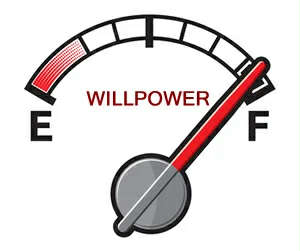
Willpower is like a muscle. It can be trained. Willpower also uses energy and is limited, just like muscles. Exerting self-control uses energy and over time, this energy can become depleted, making it easier to have the dessert, buy the shoes or sleep in past your alarm. So if you’re somebody who has difficulty with willpower, what can you do?
Believe it or not, regular acupuncture treatments can increase your willpower. Acupuncture is just one subset of an ancient medical system known as East Asian Medicine (EAM). But it is by far, the most commonly known and used. In EAM, the word for will is zhi. Pronounced “zhur,” zhi represents the deep-seated drive, determination, motivation and resolve that propels individuals toward their goals and destiny. It is the innate force that fuels perseverance, ambition and the sheer will to live and thrive, even in the face of adversity. Zhi is associated with the kidneys. So if the energy of your kidneys is strong, the will is also strong. This is how acupuncture can help increase willpower. The needles used in acupuncture treatments actually stimulate the energy of the kidneys, thus increasing willpower.
There are two sides of the coin for every organ in EAM, the yin and the yang. With regards to the kidneys and willpower, the yin is the substance that provides the drive, while also accepting the circumstances we’re given. And the yang aspect of willpower is our expression of ourselves in terms of goals, vision, ambition and aspiration. When both yin and yang are in balance, willpower is strong. However, fear frequently gets in the way of this balance and tends to override our purpose and goals. Why? Because fear is the mind’s way of keeping us safe and protecting us from harm. But anybody who has ever overcome adversity, can tell you fear probably never entered their mind or they did it regardless. All because of the willpower to attain their goals.
In today’s fast-paced world, the ancient concept of zhi resonates deeply with contemporary issues. Modern life often depletes kidney energy through chronic stress, overwork, poor sleep and environmental toxins – factors that EAM identifies as injuring zhi. This manifests as burnout, procrastination or a pervasive sense of purposelessness, conditions increasingly addressed in integrative medicine.
EAM practitioners apply zhi principles in treating mental health disorders. For instance, in cases of depression or anxiety, a lack of willpower is often traced to kidney deficiency. Acupuncture targets specific points that strengthen zhi by nourishing the kidneys, alleviating symptoms like lumbar pain, fatigue and emotional inertia.
Enhancing zhi naturally involves nourishing the kidneys through lifestyle, diet and mind-body practices. Since zhi draws from Jing, our inherited essence, preserving and building this essence is key.
Diet plays a foundational role. Consume kidney-tonifying foods like black beans, walnuts, sesame seeds, seaweed and kelp, which are rich in minerals and support the water element balance. Hydrating soups and stews, infused with bone broth or ginger, warm the kidneys and prevent cold invasion. Avoid excessive caffeine, alcohol and cold foods, which deplete yang, also known as the body’s fire.
Physical practices are essential. Qigong exercises focused on the water element, such as slow, flowing movements, cultivate zhi by circulating qi to the kidneys. Grounding yoga poses like the child’s pose or mountain pose also strengthen the willpower. Aiming for 20-30 minutes daily is usually sufficient.
Moxibustion, the burning of mugwort near specific kidney acupuncture points can warm the kidney yang for those with cold symptoms. A simple home remedy is a ginger foot soak. Mix 2 tablespoons ground ginger, 1/2 cup sea salt and lemon juice in hot water, soaking feet for 10-20 minutes to draw warmth to the kidneys.
Lifestyle adjustments include prioritizing sleep to replenish jing, managing stress through meditation and avoiding overexertion. Engage in reflective practices like journaling goals to align with zhi’s purposeful nature. Gradually challenge yourself by extending activities by five minutes or try new pursuits slowly to build resolve without depletion.
As with anything worth doing, consistency is vital. These methods, rooted in EAM, foster sustainable willpower over time. As I frequently tell my patients, if you want to look like the Rock (Dwayne Johnson), you can’t just go to the gym once. Commitment is definitely needed.
The reason EAM works so well at addressing and correcting problems with willpower is because it addresses the body holistically. EAM looks at everything: the body, mind, environment and the emotions. This allows for treatments to be customized to the needs of the patient instead of a one size fits all approach. Customized treatments allow for better outcomes. If you are finding that your willpower is lacking, consider incorporating regular acupuncture treatments into your routine. It might be the added boost that you need to reach your goals

